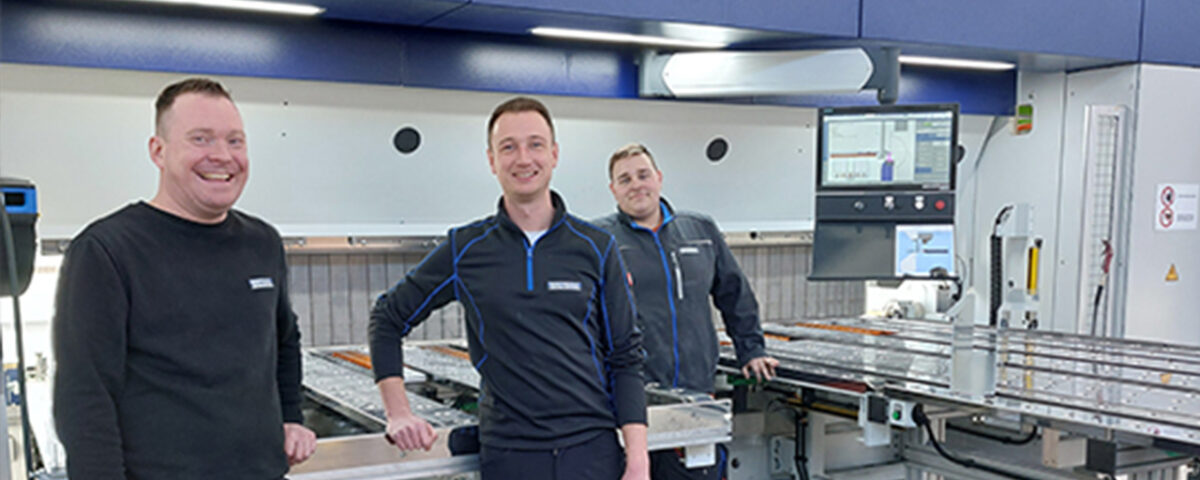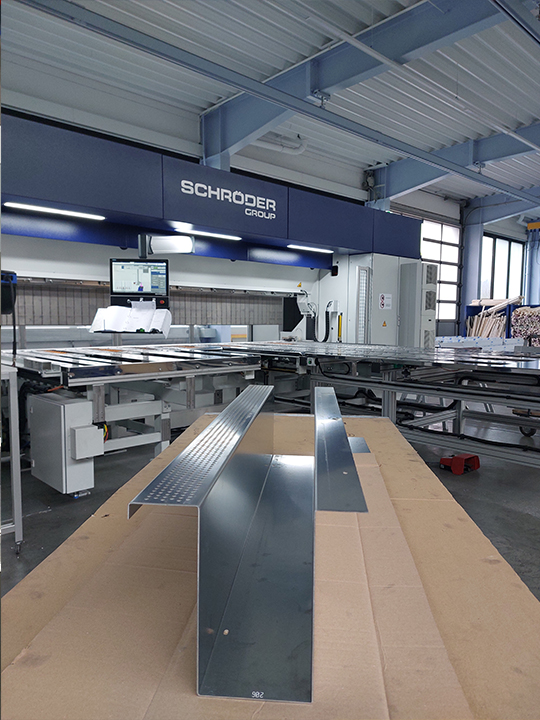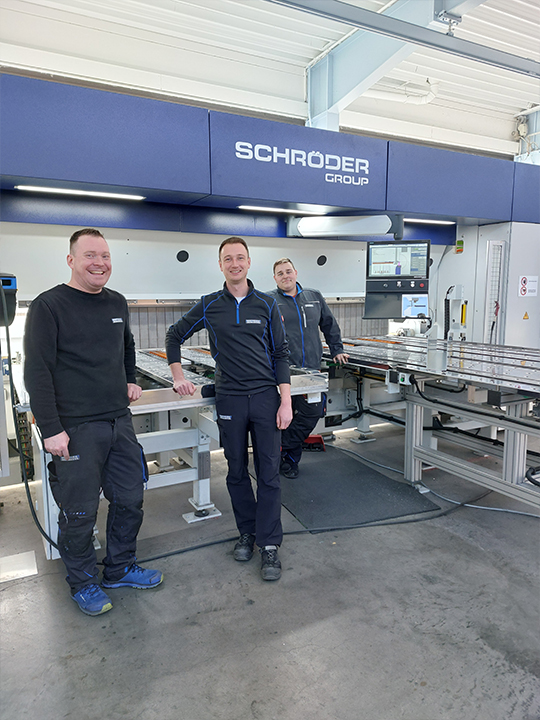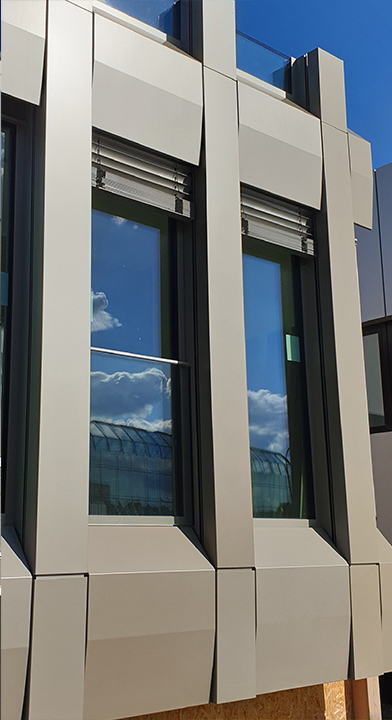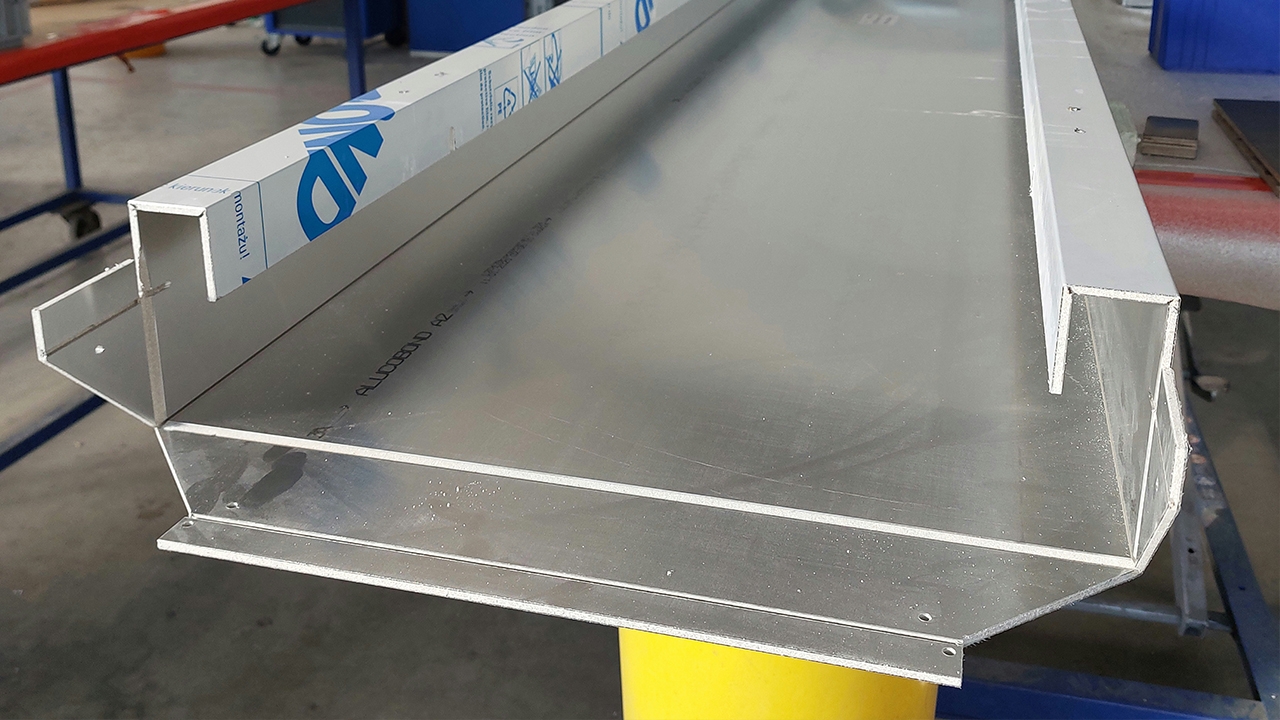Increased productivity with easier operation
Folding machine from Schröder at Hupfeld & Schlöffel Metallbau GmbH
Customer
Hupfeld & Schlöffel Metallbau GmbH in Berkatal, Hesse, manufactures façades, windows, doors and special constructions as well as fire and smoke protection elements made of aluminum. These are supplied and installed throughout Germany for everything from smaller buildings to large prestigious structures. For large orders, it is crucial to produce the construction elements from 2 to 3 mm thick aluminum sheets as efficiently as possible.
Hupfeld & Schlöffel GmbH‘s initial aim was to make it easier for employees to process large sheet formats. (www.hupfeld-schloeffel.de)
Success
With the acquisition of an EVO Center from the Schröder Group, the company, which specializes in aluminium construction elements, also increased its capacities, technical capabilities and productivity. Managing Directors Bettina Schlöffel, Eduard Schlöffel and Dennis Schindewolf became aware of a folding machine at a partner company one day. “We sometimes work with very large sheet metal formats and it was immediately clear to us that a folding machine would be much more user-friendly than a press brake for these formats,” recalls Dennis Schindewolf.
The managing directors of the 140-strong family business then visited the headquarters of the Schröder Group in Wessobrunn-Forst, Bavaria, the manufacturer of the machine they had seen, and sought advice. They were disturbed by the fact that highly qualified employees had previously been blocked from assisting with bending while a colleague struggled to position huge sheets in the bending press. On a folding machine, a single person can do the same job without any effort – especially if the possibilities of partial automation are used, which were presented to the management team at Schröder.
High degree of automation
The EVO Center was chosen. The machine is a development from the Evolution series. These are largely automated high-performance machines that the Schröder Group mainly supplies to industrial customers. The EVO Center, which has permanently changed the way Hupfeld & Schlöffel works, has a working length of 4040 mm and can bend steel sheets up to 3 mm thick with high precision. The clamping beam stroke of 850 mm and tools up to 400 mm high provide sufficient space for the production of boxes. Changeover of the machine is fully automatic. The tool changing system for clamping beam tools on the EVO Center consists of two asynchronously movable tool changers, each with a gripper unit. Servo convertercontrolled drives, motorized folding beam adjustment and central crowning stand for precision and two innovative equipment features ensure that all bends on one side are carried out fully automatically: The sheet only has to be positioned once and is taken over by the suction plate stop. Thanks to the Up-and-Down folding beam, folds and counter-folds can now be bent without having to turn the sheet.
Proven in praxis
The folding machine has met all expectations in terms of ergonomics, but also in terms of efficiency. “It‘s now more a case of cutting becoming a bottleneck,” says Marcel Röhr. The master metalworker is responsible for work preparation and machine control in sheet metal production. He cites examples of the benefits of the semi-automated folding machine: “The advantages in operation are clear, for example, with the narrow, high boxes for sun protection. The sheet metal blanks measuring up to 4000 × 1000 mm, from which they are manufactured, are easy to handle on the EVO Center – on a press brake, on the other hand, it is laborious work for two people, made even more difficult by the high tools, which have to be specially equipped with a lifting device due to their great weight.” The overhead crane in the factory hall is currently still used to transport large sheets to the folding machine. There are plans to purchase a separate crane with a suction plate.
Another example of the reduced effort required with the folding machine are cassettes for a large construction project in northern Hesse. A narrow U is bent at the bottom and a 43-degree angle at the top. What is produced in one step on the folding machine would have to be produced in two steps with one tool change on the press brake. Speaking of tool changes: “The automatic tool changer is a blessing, because large facades do not mean that we only bend large series of identical cassettes. For the above-mentioned project in North Hesse, for example, we need many different lengths,” Röhr points out.
Mechanical folding of Alucobond
Some processes have only become possible since the acquisition of the folding machine, such as the mechanical folding of Alucobond. At Hupfeld & Schlöffel, these aluminum composite panels are also folded. For this purpose, a groove is milled where an edge is required, so that only one aluminum layer remains of the two 0.5 mm thin aluminum sheets and the mineral core. Previously, this edge was created manually – now the panels that have been folded in this way are simply placed on the Schröder machine.
New possibilities thanks to radius bending
During a visit, a Schröder Group employee was able to surprise the customer. “When we learned about step-by-step radius bending, we were thrilled,” recalls Marcel Röhr. “This technology has expanded our range. For example, we now produce window sills with a round drip edge.” The “Radius Step Bending” function is a proven component of the control software developed by Schröder itself. Here, curves are created by the upper beam pressing the sheet metal in any number of fine steps against an angle created with the folding beam.
“The EVO Center not only makes our work easier, it has also increased our production capacity. We can take on projects such as a current 7000 square meter façade for a TV station without hesitation,” says Dennis Schindewolf and Marcel Röhr praises: ”If we have any problems with the machine, we simply call Schröder. We immediately reach a competent contact person there who quickly has a solution for us.”
Machine in use
EVO Center
- Folding machine up to 3.0 mm sheet thickness (400 N/mm²)
- 4040 mm working length
- Clamping beam stroke 850 mm
- Graphic control POS 3000 3D
- Fully automatic tool changer with hydraulic tool clamping
- Up-and-Down folding beam

